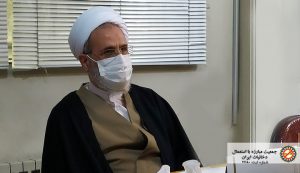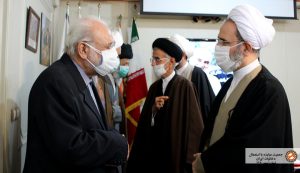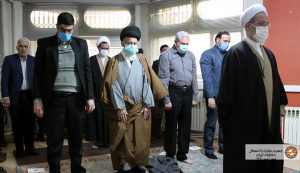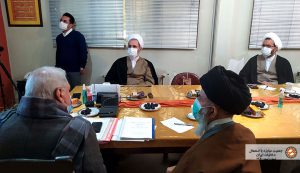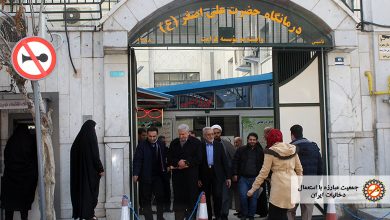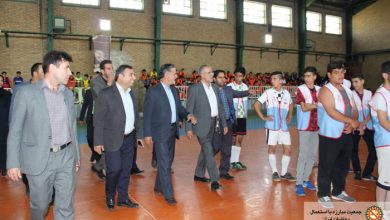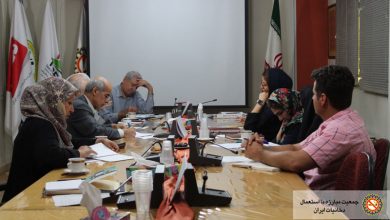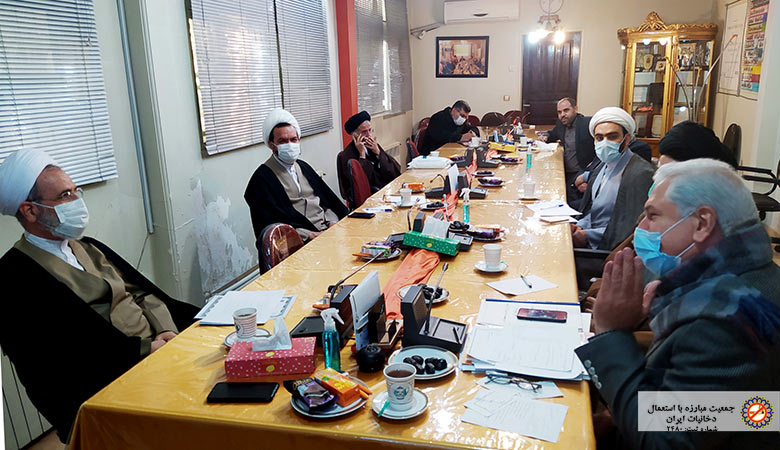
The director of the country’s seminaries, while emphasizing the serious involvement of the Ministry of Education, teachers, and educators in the issue of tobacco prevention, stated, “Culture-building in the issue of tobacco control and prevention should begin in schools with the provision of necessary deterrent educational materials.”
According to the Iranian Anti-Tobacco Association’s Public Relations, in a meeting held on the use of the capacities of the country’s seminaries to control and prevent smoking, Ayatollah A’rafi, the director of the country’s seminaries, Hujjat-al-Islam Mo’in-Shirazi, the chairman of IATA’s Board of Directors, Mohammad-Reza Masjedi, IATA’s Secretary-General, Mr. Tabra’iyan, a member of IATA’s Board of Trustees, Hujjat-al-Islam Mollanoori, the Deputy of Propaganda and Cultural Affairs of Seminaries, Hujjat-al-Islam Takiyeyi, a member of the Board of Directors of IATA’s branch in Qom, and Hujjat-al-Islam Ali-Reza Rabatian, the director of IATA’s Liaison Unit with Seminaries and Imams of Friday Prayer, were present.
At the beginning of the meeting, which was held in the office of this non-governmental organization, Ayatollah Ali-Reza A’rafi said, “In the field of narcotics across the country, statistics are presented regularly, and this shows that tobacco is a catastrophic problem that has harmful and destructive effects on health, economy, society, and culture.”
The director of the country’s seminaries said, “These destructive and harmful effects determine everyone’s task in the fight against smoking and creating suitable and useful alternatives to it. Therefore, the seminary, as an influential institution in society, has a duty to cooperate in the field of culture-building to combat tobacco. Also, any plan to reduce the consumption and supply of tobacco and, consequently, to reduce the incidence of tobacco-induced diseases should be presented with the cooperation and coordination of the authorities and those in charge.”
According to Ayatollah A’rafi, “During the COVID-19 pandemic, everyone tried to fight the disease. But the death toll from this dangerous virus is much lower than that from tobaccorelated deaths. This shows that smoking is a silent death that has not yet caught the attention of the public like other high-risk factors.”
“Tobacco consumption has economic, social, and cultural harms simultaneously, and drug addiction usually starts with cigarette consumption,” the member of the jurists of the Guardian Council said. “Teachers and educators need to become health corps so that they can do cultural work in the fight against tobacco and prevention of addiction. Of course, universities and seminaries must also complement the activities of schools in order to be effective in this area. In this way, they will be safe on their own and also will play a critical role in the health of the community.”
Announcing the readiness of seminaries in the field of culture-building to fight tobacco and prevent its use, A’rafi added, “Promoting the health of the community, especially among adolescents and young people, is very important, and we need to design models and courses through which others can join this initiative.”
National implementation of the PAD project to control tobacco consumption in the country After visiting IATA’s Faramuz Nafas-e-Pak (Clean Breath) Training Center, Ayatollah A’rafi said, “This center could be one of the most effective units in culture-building for children and adolescents in the field of tobacco control. Such centers should be established throughout the country because culture-building should be done from an early age by the Ministry of Education in schools. Therefore, we support the establishment of Faramuz units in cultural centers and schools in the whole country.” He further introduced Hujjat-al-Islam Mollanoori, the Deputy of Propaganda and Cultural Affairs of Seminaries, as his representative in the field of tobacco control and prevention.
The PAD project is a step towards the reduction of tobacco consumption in the country In the continuation of the meeting, IATA’s Secretary-General said that in the PAD project (Prevention of Smoking in Schools) various methods will be used in addition to cultural activities to reduce smoking among school students and later in the community. According to him, “This project was fully developed and approved and is now being implemented in all schools in the city of Varamin. One of the main goals of this project is to reduce smoking in schools and among students.”
“This project has a message for health and a message for smoking prevention for young people and adolescents,” Masjedi said, noting that this anti-smoking project was launched to prevent smoking. “Tobacco is an excuse and its main goal is to destroy the future of adolescents and young people as the future-makers of the country… More than eight specialized workgroups, such as medical, child-rearing, and public relations, are working in this regard to advance the PAD project scientifically and professionally.”
“The PAD project starts with school students, but it also affects the whole set, including the parents of the students and the environment around the school,” he said, noting that no such project has been implemented anywhere in the world so far. “In fact, all organizations of this city will participate in this project in different ways. For this reason, officials in various sectors were asked to cooperate with the project, and fortunately, this goal was achieved.”
According to Masjedi, the PAD project is a comprehensive program pioneered by children and adolescents. “The ‘Police Hamyar’ project that started in the Ministry of Education was a great move, to the extent that the police are present in the cars today,” he continued. “We hope that the PAD project will also have such a significant impact.”
According to Masjedi, the project will be implemented in three levels of students, schools, and families. He continued, “While thanking the cooperation of seminaries in the fight against tobacco and emphasizing the worrying statistics regarding tobacco consumption and the reduction in the age of the onset of smoking, the community needs an essential culture-building in this area. Therefore, we hope that with the cooperation of seminaries and other governmental and non-governmental institutions, the prevalence of tobacco use will be reduced.”
The resolutions of this meeting were as follows:
• Establishment of a special committee to fight tobacco in the form of strategic headquarters for social harms and jihadi headquarters;
• Holding special training courses for religious students and missionaries on tobacco prevention throughout the country;
• Serious participation in research activities;
• Using the capacities of Amin, Hijrat, and Tebyan networks regarding information-dissemination on tobacco harms;
• The regulation of tobacco supply booths in Qom.

